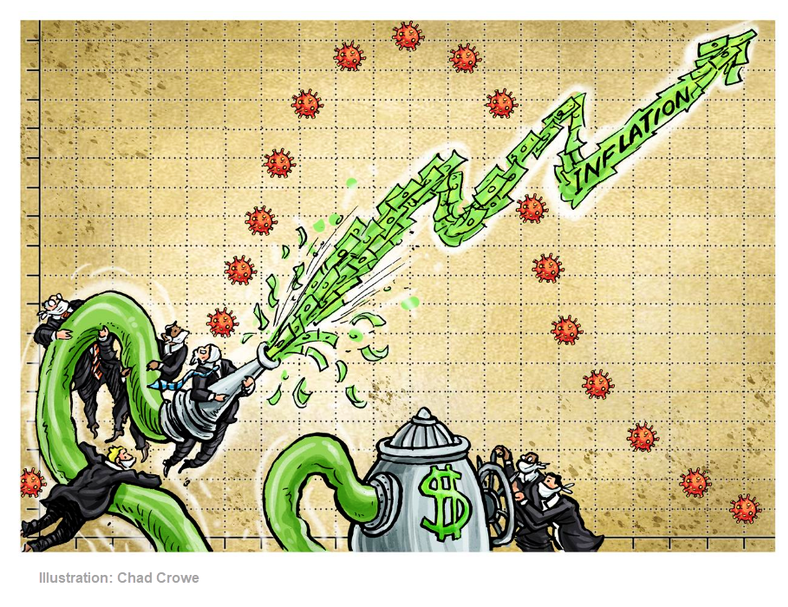インフレかデフレか?需要急落が供給ショックを上回るとMishは警告する
The inflationists are coming out of the woodwork, but they are wrong.
インフレはどこからともなくやってくると思われている、でもそれは間違っている。

Get Ready for the Return of Inflation, says Tim Congdon, in a Wall Street Journal op-ed.
インフレ復活は準備完了だ、とTim Congdonは言う、WSJのop-edで主張した。
The economists Milton Friedman and Anna Jacobson Schwartz demonstrated in “A Monetary History of the United States” that a collapse in the quantity of money was the main cause of the Great Depression. Hoping to avoid a repeat, the Federal Reserve in recent weeks has poured money into the economy at the fastest rate in the past 200 years. Unfortunately, this overreaction could turn out just as poorly; history suggests the U.S. will soon see an inflation boom.
経済学者のMlton FriedmanとAnna Jacobson Schwartzが「米国金融史」のなかで示したが、通貨量の急減が大恐慌の主要因だった。この再来を避けようと、FEDはここ数週で過去200年で最大級の速度でマネーを経済に注入した。残念ながら、この過剰反応も余り効果はなかった;歴史が示唆するところでは、米国はすぐにインフレになるだろう。
Friedman and Schwartz used a broad definition of the quantity of money that included all bank deposits, and found that U.S. money stock shrank by 38% between October 1929 and April 1933. Some prominent economists—including Princeton’s Paul Krugman and Columbia’s Joseph Stiglitz—claim that money growth no longer matters much, but they’re wrong. After all, the 2007-09 recession showed that the ever-changing fortunes of the banking system have a significant effect on demand, output and employment. From 2010-18, growth rates of the quantity of money and nominal gross domestic product were virtually identical at 4% a year.
FriedmanとSchwartzは通貨量に対して広義解釈をしすべての銀行預金も考慮した、そして米国マネーストックは1929年10月から1933年4月までの間に38%縮小したことを確認した。著名な経済学者ーープリンストン大学のPaul Krugmanやコロンビア大学のJoseph Stiglitaーーはマネーの増加はもはやそれほど問題にならないと主張する、しかし彼らは間違っている。結局の所、2007−09の景気後退では、 銀行システムの変容が需要、生産、雇用に重大な影響を与えた。2010−18の間のマネー供給量の増加速度と名目国内生産増加はほとんど同数で年率4%の成長だった。
Policy makers have repeatedly called the battle against the novel coronavirus a war. As in wartime, federal expenditures are rising sharply while tax revenues are being hit by the lockdown. Both World War I and World War II—and, indeed, the Vietnam War—were followed by nasty bouts of inflation. If that happens again, policy makers today being cheered for their swift, decisive action will instead have to answer for their grave lack of foresight.
政策立案者たちは繰り返し、武漢コロナ対策を戦争に例える。 戦時と同様に、連邦政府歳出は急増し、都市閉鎖で税収は急落する。第一次第二次世界大戦そしてベトナム戦争においても、戦後は忌まわしいインフレに見舞われた。もしこれが繰り返すというなら、現代の政策立案者の素早い過剰反応というのは、逆に先見の明が無いことになる。
Inflation View is Wrong
インフレ見立ては間違っている
However, the collapse in demand, dwarfs supply shocks and monetary printing.
インフレ見立てはこれまで述べたように幅広く受け入れられている。人によってはハイパーインフレまで言及する。しかしながら、需要急落で、供給ショックや紙幣印刷の効果がとても小さくなっている。
The Fed Will Soon Need to Stem Deflation
FEDはすぐにデフレ対策に迫られるだろう
エコノミスト Tim Duyの考えはこういうものだ。Duyが言うには、FEDはすぐにデフレ対策に迫られるだろう。
It was common early in the crisis to view the viral outbreak as a supply shock because, from the U.S. perspective, it appeared to be largely impacting the flow of goods from China. This original view suggested an inflationary impact from the virus.
危機の当初に広く受け入れられていた見立てとは、 ウイルスアウトブレイクが供給ショックを引き起こすだろうというものだった、というのも米国に関しては、中国からの輸入に大聞く依存しているからだ。この当初の見立てはウイルスによるインフレを示唆していた。
The demand-side impact, however, now clearly dominates the economic outlook. Shutting large portions of the economy resulted in a collapse in spending and surging unemployment.
しかしながら、需要側のインパクトが今や明確で、これが経済見通しを支配している。経済活動の大半がシャットダウンすることで、消費も雇用も急落している。
Not only do we have a collapse in demand, but the eventual rebound in activity is likely to be anemic, too.
今我々が直面しているのは需要急落だけではなく、さらには経済活動復活が弱々しいことだ。
The result will be a protracted, substantial output gap that will weigh not only on inflation but inflation expectations as well. That shift in expectations will weigh on demand. For instance, a student recently asked me if I thought this was a crazy time to buy a car. I said it would be better to wait a few months for prices to come down instead.
結果として長期に渡りアウトプットギャップが生じ、インフレだけでなくインフレ期待にも影響する。この期待変化が需要に影響するだろう。たとえば、最近私は学生にこう問いかけられた、今車を買うのは馬鹿げていいるだろうか。私の答えはこうだ、数ヶ月待ったほうがよい、値段が多分下がると思う。
What About Wage Pressures?
給与の圧力はどうなる?
Duyはこの興味深い点を指摘した、最新の経済状況を示すFEDベージュブックを見てのことだ。
No District reported upward wage pressures. Most cited general wage softening and salary cuts except for high-demand sectors such as grocery stores that were awarding temporary “hardship” or “appreciation” pay increases.
どの地方連銀も給与増圧力を報告していない。多くが指摘するのが一般的給与の軟化と需要の高い食料品店以外での給与カットだ、 これらを見ると今の所給与増は「困難」だろう。
Deflation Summation
デフレ予想を要約すると
- Demographics 人口動態
-
No wage pressures 給与増圧力はない
-
Falling demand 需要下落
-
Anemic rebound 景気回復は弱々しい
-
Eurozone basket case supports the dollar 対欧州通貨でドルは支えられている
こういう状況の中で人々がインフレを懸念しているというのは奇妙なことだ。
Inflation Targeting Silliness
インフレ目標も沈黙
しかしDuyが指摘しないことが一つある。
Still, watch for deflation concerns to eventually reveal themselves in increasingly strong language reinforcing the Fed’s commitment to a 2% inflation target followed by forward guidance to more strongly lock in expectations that the central bank will not reverse policy easing anytime soon.デフレ懸念が強まると最終的にはFEDの2%インフレ目標への批判が高まるだろう、フォワードガイダンスとしてインフレ目標を掲げており、中央銀行は緩和政策を反転させないだろう。
Duy is on the right track, but he failed to blame the Fed.
Duyの主張は最もだが、彼はFEDを責めることはしない。
Very Deflationary Outcome Has Begun
とてもデフレ的な出来事が起き始めている
とてもデフレ的な出来事が起き始めている:FEDの責任だ
Economic Challenge to Keynesians
ケインズ主義経済学への挑戦
多くの人が信じているが、しかし明らかに間違った経済的信念というのは、物価下落は経済にとって悪いことだという馬鹿げた考えだ、これに関しては何らかの対処が必要だ。
My Challenge to Keynesians “Prove Rising Prices Provide an Overall Economic Benefit” has gone unanswered.
ケインズ主義者はこういう「物価上昇は全体的に経済にとって望ましい」、私はこれに疑念を持っているがまだ明確な答えが無い。
BIS Deflation Study
BISのデフレ研究
BISは過去の歴史を研究し、デフレは全く問題ないという。
“Deflation may actually boost output. Lower prices increase real incomes and wealth. And they may also make export goods more competitive,” stated the BIS study.「デフレは生産性を向上させるかもしれない。物価が下がると実質賃金や実質資産は増える。そして輸出競争力は有利になる、」とBISの研究は述べる。
Deflationary Outcome
デフレの結末
The existing bubbles ensure another deflationary outcome.
既存のバブルはさらなるデフレを確実なものにしている。
Deflation is not really about prices. It's about the value of debt on the books of banks that cannot be paid back by zombie corporations and individuals.
デフレは物価にだけ現れるわけではない。銀行の債務簿価の価値にも影響する、ゾンビ企業や個人は返済不能となる。
That is what the Fed fears. It takes lower and lower yields to prevent a debt crash. But it is entirely counterproductive and it does not help the consumer, only the asset holders. Fed (global central bank) policy is to blame.
これこそFEDが恐れていることだ。こうなると更に金利を引き下げ債務破綻回避に向かわざるを得ない。しかしこうなると生産性向上とは全く逆のことになり、消費者は救われない、救われるのは資産を持っている人だけだ。FED(世界の中央銀行も)政策が責められるべきだ。
So prepare for another round of debt deflation, possibly accompanied by a lower CPI especially if one accurately includes home prices instead of rents in the CPI calculation.
というわけでさらなる債務デフレに備えるときだ、多分CPIは更に低下し、CPI計算の帰属家賃ではなく住宅価格が下落するだろう。
For a discussion of the BIS study, please see Historical Perspective on CPI Deflations: How Damaging are They?
BISの研究の議論からして、歴史的なCPIデフレを俯瞰することだ:デフレは如何にダメッジをもたらすか?
Inflation targeting is one of the reasons why we are in such a mess for the third time in 20 years.
この20年でもう三度目になるこのこの混乱がどうして起きたか、インフレ目標がその一つの理由だ。
Bubbles are Inherently Deflationary
バブルというのはデフレ的なものだ
When asset bubbles burst, debt deflation results.
資産バブルデフレというのはダメッジをもたらす、いつもの物価デフレではない。資産バブルが弾けると、債務デフレが起きる。
Here we go again as Hyperinflationists Come Out of the Woodwork Again.
こうなると我々はまたもや、どこからかハイパーインフレが生じるという振り出しに戻る。




